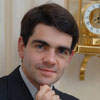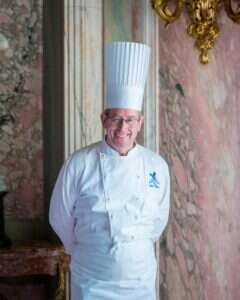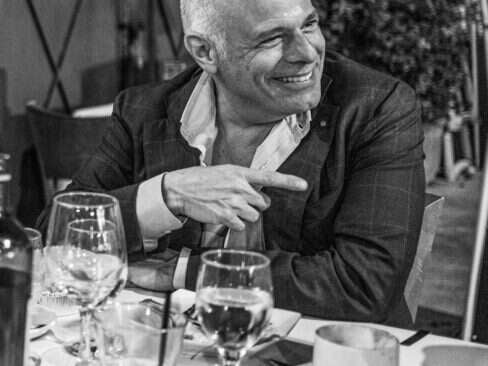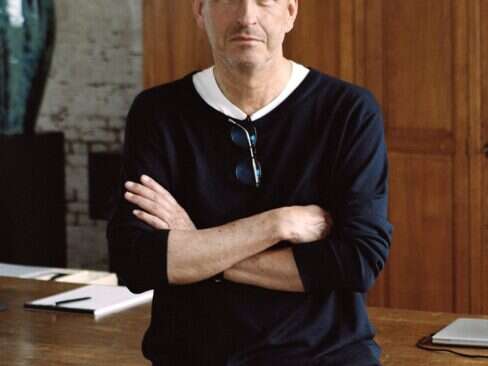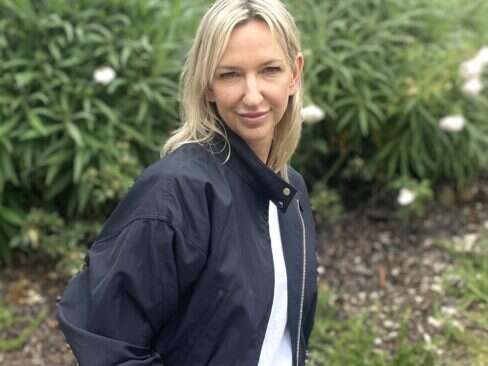
CEOJaeger-LeCoultre
Jaeger-LeCoultre traces its history back to the early 19th century, and now under the guidance of CEO Jérome Lambert, a company veteran and former CFO, it has partnered with companies such as Aston Martin, expanded with the opening of a Beverly Hills boutique and created brand awareness with provocative marketing such as “Have you ever worn a real watch?” greeting visitors when they visit the company’s website. Elite Traveler President and Editor-in-Chief, Douglas Gollan, went into the mountains of Switzerland’s watch-making country, Le Sentier, to find out what’s behind the aggressive push and what keeps Lambert running.
ET: Maybe you can start by telling us a little bit about your background. I know you’ve been with Jaeger-LeCoultre for a while, but where did you start your career and what brought you to Jaeger-LeCoultre ?
Jérome Lambert: I joined Jaeger-LeCoultre now roughly 11 years ago. I joined the company when I was 28—I’m 39 now—I was quite young at the time. I joined the company as financial controller and I was employed as CFO in the year 2000 and finally CEO in 2002. I’ve been CEO of Jaeger-LeCoultre for the last six years.
What made me come to Jaeger-LeCoultre and join is probably what keeps me at Jaeger-LeCoultre today, even if my position is now completely different. It’s the passion, the values of the brand and the team that make all of this so amazing.
I was coming from a completely different industry and one much larger, and even as a strong financial controller, my responsibility was probably 100 times more when I joined Jaeger-LeCoultre 11 years ago. Once I met the people I could understand a little bit more about the passion and about their pride in sharing a brand like Jaeger-LeCoultre. It’s a pleasure to create with them and to see what pride they have for the 175 years of history of the brand. I spend my afternoons on many projects, in discussions and meetings, and I find people understand the challenge, people meet the challenge, people want to make a difference. So that’s the strength of Jaeger-LeCoultre.
And LeCoultre is carried forward by all the generations, one after another. Through their inventiveness, their entrepreneurship, their capacity to survive in such hard conditions—we’re at 1,000 meters here—they managed to form the first concept, the first watch of LeCoultre into what it is today.
ET: You know, it’s interesting, you talked about your background in finance. The watchmaking business is a business about, as you mentioned, passion and creativity. For readers who may come from a financial background, what advice would you give them if they became a CEO of a company that was driven by creativity? Were there some things that you had to change about the way you looked at the business?
Jérome Lambert: Of course as a leader, you have to carry forward the vision and create a dynamic within the group, but that’s how a team works. And what is definitely crucial is that as a professional you are able to understand others and are able to capture the values of the brand, and be strategic enough to propel the company in a way that suits what the company is made for and what the market can expect from that company.
So, as far as myself, I will not do the drawing of the watches. I’m a very poor artist, but through my cultural background, my openness, my capacity to understand others and interact with them, I am able to manage a team. Probably what I do best is understand what the next challenge is for Jaeger-LeCoultre and what the concept is behind a new watch line by understanding what happens in the market, by meeting the right people, by interacting with other clients and so on and so on.
I was 33 when I became the CEO of Jaeger-LeCoultre. Now I’m 39 and all that time I was learning a lot about the Jaeger-LeCoultre company, about what makes the brand so successful in the watchmaking market. It’s important to learn about the creative side to understand the business better as a whole.
ET: Tell us a little bit about the company when you came 11 years ago. How big was it? And tell us about where the company is today.
Jérome Lambert: The company was not a fourth of what it is today in terms of activity, in terms of collections, in terms of depth of collection, in terms of international presence. But at the same time, the talent, the capacity, the knowledge and culture for fine watchmaking was all here.
If we just consider the last few years, Jaeger-LeCoultre has been the brand that has been the most awarded internationally and received something like more than 130 international prizes for best watch, best chronograph, best special watch, etc.
We have registered more than 20 patents a year over the last few years. We have created grand complications such as the Gyrotourbillon 1, the first spherical tourbillon; we have created the Reverso Grande Complication à Triptyque, the first watch with three faces; we have created Gyrotourbillon 2, probably the most precise mechanical watch, and so on and so on. So even if it was different before than what it is today we have the same values, most of the same people and the capacity to meet the challenge of excellence in fine watchmaking.
ET: So Richemont bought Jaeger in 2000, was it?
Jérome Lambert: Yes.
ET: A lot of times when big companies buy other companies, they try and merge the company into their way of doing business, but Richemont has a reputation for letting each of the houses operate autonomously. Maybe talk to us a little bit about that philosophy—both the good part of it and if there is a negative to that as well?
Jérome Lambert: Well Mr. Rupert has always had views, long term views, on what each maison and each brand can do. Of course we have to perform. We have to develop ourselves. With that said, Mr. Rupert has never sacrificed the value of the brand or of the house for his view.
So that explains why the integration of a maison like Jaeger-LeCoultre has been done with a lot of attention to preserve what was essential in terms of technical mastery and technical innovativeness, but also while adding a complete new dimension in terms of international exposure and a chance to develop the retail aspect and give the brand a much stronger marketing and sales structure.
ET: I had a chance awhile ago to interview Richard Santulli, Chairman of NetJets, which is owned by Berkshire Hathaway, and you know, he works for Warren Buffet. Tell me, what is it like to work for Mr. Rupert, because he also is known as one of the great entrepreneurial CEOs? What are your interactions with him like? What’s he like as a boss?
Jérome Lambert: As I said, he has a great sense of value and three amazing capacities. The first one is that he has strong charisma. So if you are in a group with him he has enough charisma to lead the group and you feel his leadership very strongly.
The second thing is definitely that he is capable of projecting where each of the maisons should be in the future; he has a fairly clear view of what the group and the maison should be in five to ten years. He has good vision and a good perception of what can be expected.
The third thing is that he is also very capable of acting like an everyday client or an everyday external office to challenge each maison in its choices. So that means that he’s very capable of distancing himself from the daily internal business and is able to receive a challenge and to challenge each of us in his conviction and his perception of the truth in a very guiding way.
ET: Do you hear from him on a daily or weekly basis?
Jérome Lambert: Oh, no, that’s not the way Mr. Rupert acts. He is definitely clear on his objectives. He is clear on the delegation, on the key strategy points and the frame in which we have to execute them. If we do not respect what is in the frame and what is agreed to be done then we may have him on the phone but so far, so good.
ET: Off of work for a little bit, do you have any passions, hobbies or things you like to do when you’re not working?
Jérome Lambert: Millions of things. Well the first thing I love to do is spend time with my wife and two daughters. The oldest one is seven and the youngest is five.
Besides that I’ve been riding horses since I was five years old, so when I have a little bit of time I ride and practice jumping. Then I also run a lot. Next Sunday I have a half-marathon to run.
ET: Is that your first half-marathon or have you run one before?
Jérome Lambert: Oh, no, no. I do three or four each year.
ET: Marathons?
Jérome Lambert: No, no, half. I don’t have the time to train for a marathon. For a half-marathon I run once a week for an hour, or an hour and a half. That’s the only time I can find.
ET: You mentioned jumping. Did you ever professionally ride horses?
Jérome Lambert: No, not professionally. It’s just my passion and my pleasure.
ET: Do you get a chance to ride horses in some of the places you travel to?
Jérome Lambert: Yeah, a little bit because, as you know, the Reverso [watch] has been created for polo players and we do a large number of events with polo with some of the best polo players in the world. From time to time I can practice and I ride on polo ponies on polo fields. I have in Argentina and in India; those are some places where I could ride a little bit and have the time to ride.
ET: What about when you’re traveling, do you run? Any favorite places you go for runs?
Jérome Lambert: I love London and I love New York for running. In New York, the first time you go there you think at six o’clock in the morning you’re going to be alone; it’s dark out. Instead, there are 2,000 people around you jogging, running, bicycling and so on. You feel the energy of everybody around you and I love it very much. Then I love to go running when I’m in Venice as well because you are running around the seaside and it’s very nice.
ET: While we’re talking about traveling, either for business or leisure, are there any favorite hotels or resorts that you’ve stayed at?
Jérome Lambert: I just had the opportunity to stay in a very nice resort in China called Fuchun Resort. It’s near the city of Hangzhou. It’s about two hours from Shanghai, so a lot of Shanghainese go there to have a good time, and Fuchun Resort is a complete resort with an amazing golf course, an amazing spa and pool, and the nature around is very nice also.
ET: Any hotels you like when you’re traveling around the world?
Jérome Lambert: I like the Park Hyatt in Buenos Aires a lot. Buenos Aires is an amazing city and the Park Hyatt is a very nice place.
ET: I guess back to business for a minute. You know, obviously, the financial markets around the world are not doing very well and the last I looked the Dow was down about 300 points today. How is business going for your company and are there any changes you’re making because of such uncertain times?
Jérome Lambert: Things are very new so the real impact of the financial crisis is definitely to come; we are just at the very beginning of this phase. We definitely need another few weeks to measure completely the impact of it. My philosophy is to take some distance, while of course keeping the company on track and on the safe side.
ET: So is there anything new or important that you want to talk about that’s recently been launched or any new twists that we can expect?
Jérome Lambert: The first one is definitely the AMVOX2 DBS Transponder, which we created with Aston Martin. It’s a very high-end watch that’s all gold and platinum, and has a vertical chronograph and three patterns inside. And with the watch you can open your car, lock your car, switch on the lights so you can find where your DBS car is and have all your car settings programmed. We have miniaturized all of the systems that they have in their keys and encapsulated them in a watch.
ET: The watch goes for what, about 200,000 or a little bit more?
Jérome Lambert: 250,000€.
ET: 250,000€? And how much is the watch if you own the car?
Jérome Lambert: 27,000€.
ET: That’s a good bargain. So are there any other things that you’d like to talk about or share?
Jérome Lambert: Well just that the last year has been very rich in allowing for a lot of creativity in every field—not only in watches, but also in hotels, in locations, in cars. It shows that the borders can always be pushed forward and can definitely be surpassed. So I’m just hoping that we keep the same dynamism and the same sense of creativity that we’ve always had because you never know what we’ll come up with.





